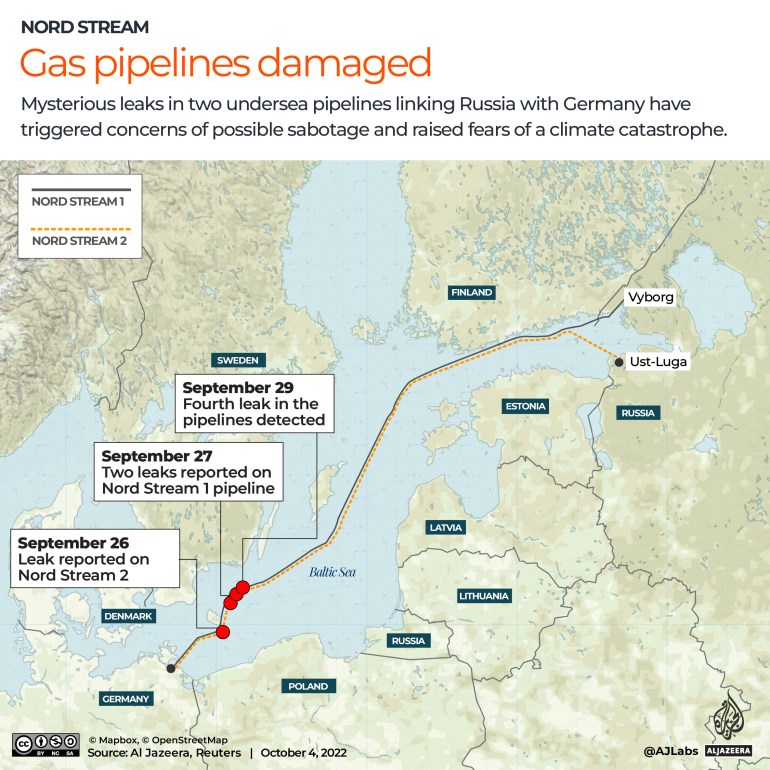Russia says British forces blew up Nord Stream; UK denies claim | Russia-Ukraine war News
British naval ‘specialists’ sabotaged the critical gas pipelines last month, Russian defence ministry claims, but UK says Moscow is ‘inventing stories’.
British navy personnel planted explosives and blew up the Nord Stream gas pipelines last month, Russia’s defence ministry says, a claim London called false and designed to distract from Moscow’s military failures in Ukraine.
Russia did not give evidence for its allegation that a leading NATO member had sabotaged critical Russian infrastructure amid the worst crisis in relations between the West and Moscow since the depths of the Cold War.
The Russian ministry alleged “British specialists” from the same unit that directed Ukrainian drone attacks on ships from the Russian Black Sea fleet in Crimea earlier on Saturday were responsible for the Nord Stream pipeline sabotage.
“According to available information, representatives of this unit of the British Navy took part in the planning, provision and implementation of a terrorist attack in the Baltic Sea on September 26 this year – blowing up the Nord Stream 1 and Nord Stream 2 gas pipelines,” the ministry said.
The United Kingdom denied the accusation.
“To detract from their disastrous handling of the illegal invasion of Ukraine, the Russian ministry of defence is resorting to peddling false claims of an epic scale,” the British defence ministry said.
“This invented story says more about arguments going on inside the Russian government than it does about the West.”

‘Series of terrorist attacks’
Maria Zakharova, a spokeswoman for Russia’s foreign ministry, said Moscow will seek a reaction from the United Nations Security Council, saying on social media it wanted to draw attention to “a series of terrorist attacks committed against the Russian Federation in the Black and Baltic Seas, including the involvement of Britain in them”.
Russia, deeply isolated by Western nations since its February 24 invasion of Ukraine, has previously blamed the West for the explosions that ruptured the Russian-built Nord Stream 1 and Nord Stream 2 pipelines on the bed of the Baltic Sea.
But it had not previously given specific details of who it thinks was responsible for the damage to the pipelines, previously the largest routes for Russian gas supplies to Europe.
A sharp drop in pressure on both pipelines was registered on September 26 and seismologists detected explosions, triggering a wave of speculation about sabotage to one of Russia’s most important energy corridors.
Pipeline mystery
Sweden and Denmark have concluded that four leaks on Nord Stream 1 and 2 were caused by explosions, but have not said who might be responsible. NATO Secretary-General Jens Stoltenberg has called the damage an act of sabotage.
Sweden ordered additional investigations to be carried out into the damage, the prosecutor in the case said in a statement on Friday.
The Kremlin has repeatedly said allegations of Russian responsibility for the blasts were “stupid”, and Russian officials have said Washington had a motive as it wants to sell more liquefied natural gas to Europe.
The United States has denied involvement.
Russia has said Western countries have not allowed it to take part in international investigations of the explosions. Instead, it has for weeks hinted its security services have a different version of what caused the blasts.
French Prime Minister Elisabeth Borne expressed scepticism over the Russian accusations. “There is an investigation under way and I give no credence to what was said this morning,” she told reporters.
The Nord Stream 1 and Nord Stream 2 pipelines have a joint annual capacity of 110 billion cubic metres – more than half of Russia’s normal gas export volume.
Sections of the 1,224km (760 miles) long pipelines, which run from Russia to Germany, lie at a depth of about 80-110 metres (262-361 feet).

Pingback: uniccshop
Pingback: funny987
Pingback: visit this page
Pingback: check out here
Pingback: คลินิกปลูกผม
Pingback: redirected here
Pingback: Chicken Road automat
Pingback: 1xslots casino